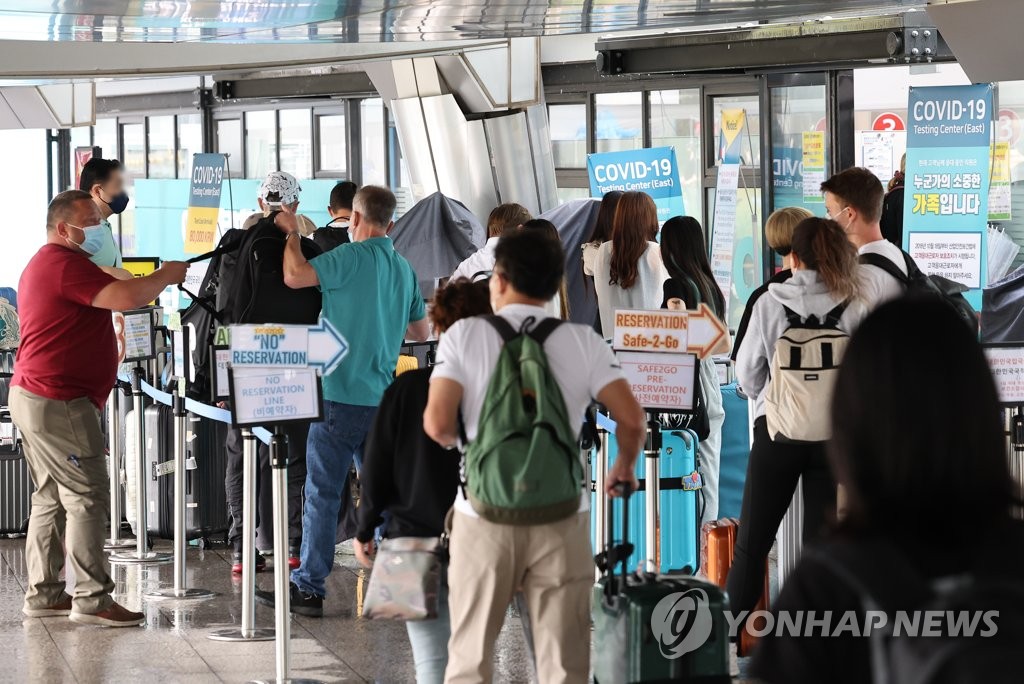- California Assembly OKs highest minimum wage in nation
- S. Korea unveils first graphic cigarette warnings
- US joins with South Korea, Japan in bid to deter North Korea
- LPGA golfer Chun In-gee finally back in action
- S. Korea won’t be top seed in final World Cup qualification round
- US men’s soccer misses 2nd straight Olympics
- US back on track in qualifying with 4-0 win over Guatemala
- High-intensity workout injuries spawn cottage industry
- CDC expands range of Zika mosquitoes into parts of Northeast
- Who knew? ‘The Walking Dead’ is helping families connect
S. Korea to lift pre-travel COVID-19 test requirement for inbound travelers this week
South Korea will lift its current pre-travel COVID-19 test requirement for inbound travelers later this week, an official said Wednesday, as the government believes the recent virus wave has passed its peak and the spread of omicron could slow down.
The new rule that will take effect Saturday came after a state infectious disease advisory committee recommended the government lift the mandatory pre-travel polymerase chain reaction (PCR) tests for inbound travelers.
“All inbound travelers, whether our nationals or foreigners, arriving aboard a plane or ship will not need to hand in a negative PCR test starting midnight of Sept. 3,” Second Vice Health Minister Lee Ki-il said in a virus response meeting.
The new measure will be applied to all arrivals, regardless of their vaccination status or the country of departure.
Currently, inbound travelers are required to show a negative result within 48 hours of their PCR tests or within 24 hours of their rapid antigen tests to enter the country.

Inbound travelers from abroad stand in line to take coronavirus tests at a testing station at Incheon International Airport, west of Seoul, on Aug. 30, 2022. (Yonhap)
Critics and the travel industry have called for the requirements to be scrapped, citing low efficiency of the tests that often lack accuracy and cost burdens for individual travelers. They also cited other countries that have removed the test mandate.
“The virus has been slowing in other countries and we have also confirmed a decline in nine weeks,” Peck Kyong-ran, commissioner of the Korea Disease Control and Prevention Agency (KDCA), said.
“The decision is aligned with the global trend of discontinuing the negative PCR test submission, although we will quickly toughen the entry procedure in the event of another variant outbreak,” Peck said.
Travelers still need to take a PCR test within the first 24 hours of their arrival in South Korea, a “minimum measure” put in place to prevent the inflow and spread of any variant from overseas. Rapid antigen tests will not be accepted.
Under the law, violators of the post-arrival PCR test rule will face up to one year in prison or a maximum fine of 10 million won (US$7,460). They can be liable for civil damages in case their violation causes damage to the South Korean government over additional quarantine measures and the spread of the pandemic.
The government said it plans to introduce the retooled COVID-19 vaccines known to be more effective for the BA.5 omicron variant, the dominant strain in the current virus wave, in the fourth quarter of this year.
Those aged 60 and over, or with underlying health conditions, will be prioritized for inoculation.
Authorities will also start allowing the inoculation of SKYCovione vaccines, developed by SK Bioscience, from next month.
On Wednesday, South Korea reported 103,961 new COVID-19 infections, including 458 cases from overseas, bringing the total caseload to 23,246,398, the KDCA said.
The latest daily tally is down from Tuesday’s 115,638. Health authorities and experts said the recent virus wave has passed its peak, and they expect to see a gradual slowdown of the omicron spread for some time.
The country added 75 COVID-19 deaths, putting the death toll at 26,764.
The number of critically ill patients stood at 569, down 22 from the previous day, the KDCA said.
As of 9 p.m. Wednesday, the country had reported 79,977 additional infections, down 20,813 from the same time the previous day and down 29,356 from the previous week, according to health authorities and provincial governments. Daily virus cases are counted until midnight and announced the following morning.











